Microsoft Surface Pro Review
by Anand Lal Shimpi on February 5, 2013 9:00 PM ESTSurface Pro as a Tablet
If you can get over the bulk, Surface Pro is easily the fastest tablet on the market today. Apple has done a great job of making relatively slow hardware feel very fast with iOS, but Surface Pro brute forces its way to the top. Web pages load quicker than on any ARM based tablet and multitasking is just awesome on the device. This is where the power of Intel’s Core microarchitecture really comes into play.
Since the introduction of the 3rd generation iPad with Retina Display several folks have pointed out to me that UI frame rate isn’t always so smooth on the device. I personally never noticed because I found that most of the competition was even worse, so it always seemed relatively smooth to me. After playing with Surface Pro however and going back to even the 4th gen iPad all of the sudden frame rate stutters are much more noticeable. Playing around with Bing maps on Surface Pro vs. RT is like night and day. Even if you compare scrolling and zoom performance to native iOS maps on the iPad 4, Surface Pro wins out.
Scrolling in web pages, application install time, file copy time, everything is just significantly faster on Surface Pro than on any competing tablet. Oh, and it boots (from full power off) in less than 10 seconds. It’s really the combination of the great CPU performance and fast SSD that deliver the responsiveness of the Surface Pro.
We’re still lacking good cross-platform performance tests, but there are a few browser based benchmarks that I can use to highlight just how much faster Surface Pro is compared to anything ARM based on the market today:
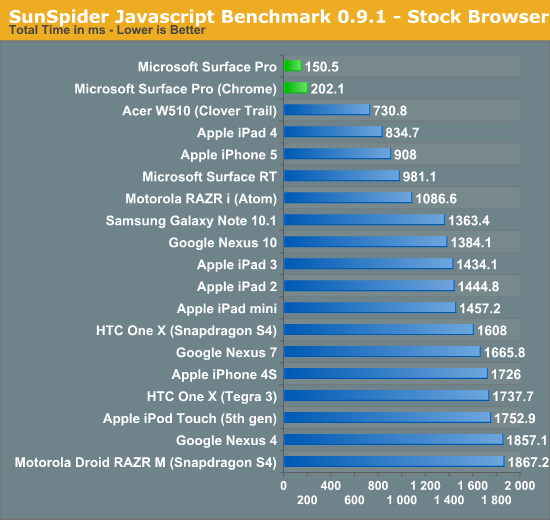
SunSpider is our tried and true quick js benchmark, and here we see huge scaling as we move to Intel's Core i5. Regardless of browser used you're seeing a significant improvement in performance that directly translates to faster web page load times.
Moving on we have Kraken, a seriously heavy javascript benchmark built by Mozilla. Kraken focuses on forward looking applications that are potentially too slow to run in modern browsers today. The result is much longer run times than anything we've seen thus far, and a very CPU heavy benchmark:
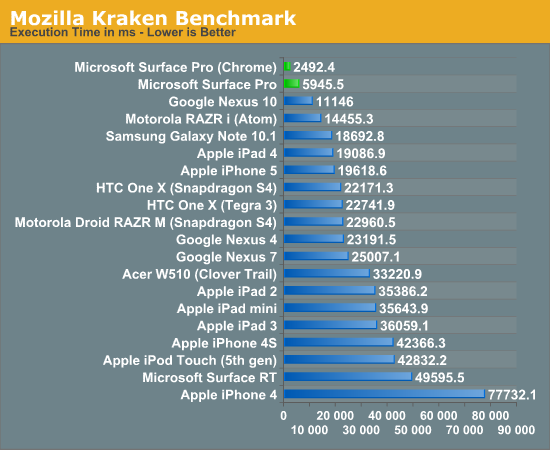
Even when handcuffed by modern IE10 you're looking at almost twice the performance of the Nexus 10. Level the playing field with Chrome as a browser and now Surface Pro completes the test in a bit more than 1/8 of the time of the iPad 4, or 1/4 of the time of the Nexus 10.
Surface Pro manages to deliver almost 5x the performance of the iPad 4 here.
We have one last web-based benchmark: WebXPRT by Principled Technologies (PT). WebXPRT measures performance in four HTML5/js workloads:
Photo Effects: Measures the time to apply effects to a set of six photos. The filters are Sharpen, Emboss, and Glow. WebXPRT applies each filter to two photos. This test uses HTML5 Canvas 2D and JavaScript.
Face Detect: Measures the average time to check for human faces in a photo. WebXPRT runs this test on five photos and uses the average time to calculate the final result. This test uses HTML5 Canvas 2D to get access to photo data. The detection algorithm is implemented in JavaScript.
Stocks Dashboard: Measures the time to calculate financial indicators of a stock based on historical data and display the result in a dashboard. The calculations are done in JavaScript, and the calculated stocks data is displayed using HTML tables and Canvas 2D.
Offline Notes: Measures the time to store notes securely in the browser's HTML5 local storage and display recent entries. This test uses using AES for security.
We're reporting the overall score after all tests have been run:
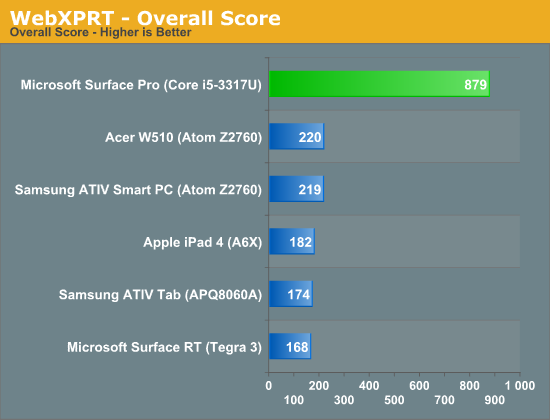
Next up are another set of benchmarks from PT, but unlike the WebXPRT suite these tests don't run in a browser. Once again we're looking at performance in a handful of tasks designed to stress the CPU. Here the performance advantage continues to be quite significant. While Surface RT and the other Windows RT/8 devices still feel a bit sluggish, I have no performance complaints whatsoever about Surface Pro:
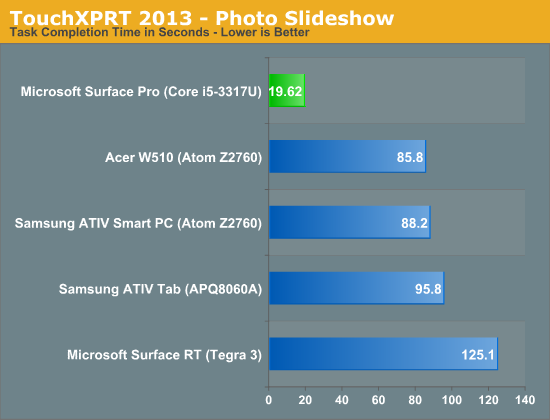
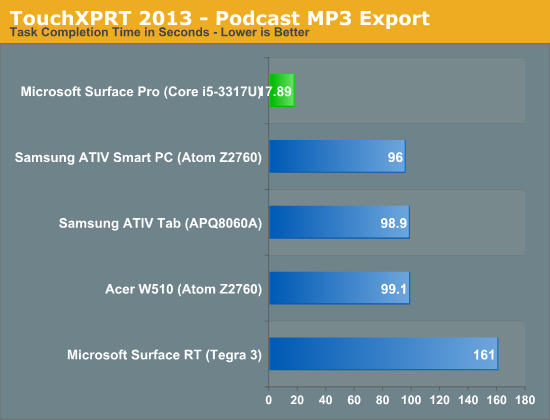
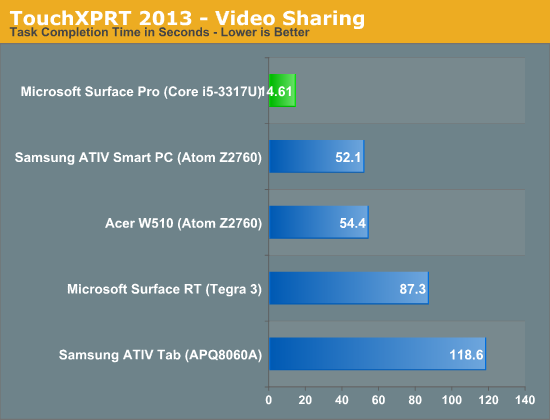
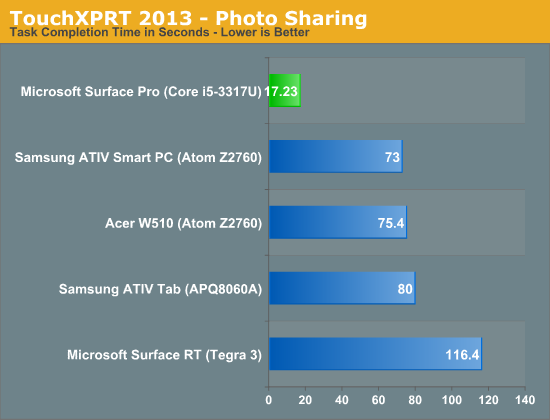
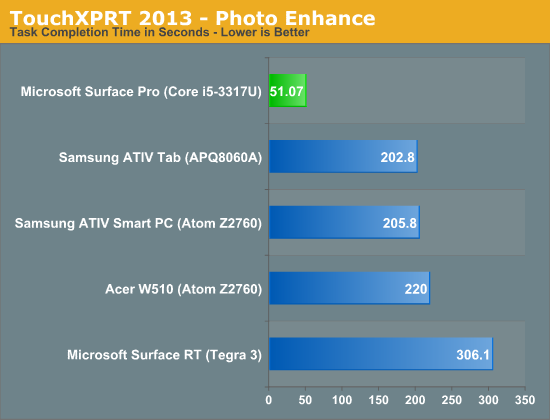
If I had any complaints about using Surface Pro as a tablet outside of weight, they’d be about Windows 8. There are still far too many bugs and quirks in the OS that just don’t make sense. I’ve outlined some of my issues with Windows 8 before. I think the UI works just fine for a tablet, it’s just the unfinished touches that need attention. For example, having to gesture in modern IE10 before being able to switch between tabs seems silly.
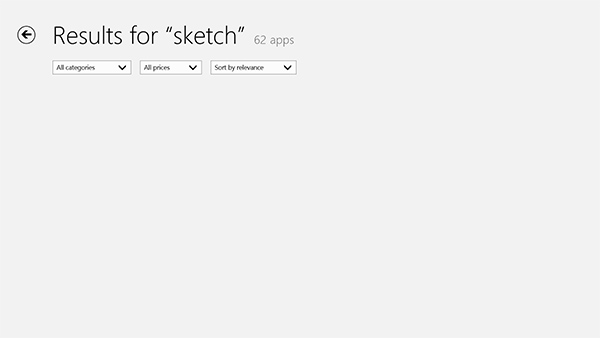
This still happens way too often in the Windows Store, no indication of what's going on just a blank screen
On the bug-front, all too often I’ll wake up the system only to have the lock screen upside down. And despite all of the extra performance under the hood, the time from when you hit the power/lock button to when something appears on the screen is just longer than on an iPad or Android tablet. We’re not talking several seconds, but it’s still noticeably longer.










228 Comments
View All Comments
kyuu - Thursday, February 7, 2013 - link
Lol? You only agree with Anand when he gives glowing reviews of Apple products.chizow - Wednesday, February 6, 2013 - link
I really like the idea behind Surface, but it just needs some refinement and improvements in hardware that only time and process fabrication brings.20% faster CPU speed, 50% better battery life, 40% smaller form factor, and 25% lower price ($700-750 range with a cover included) and I think Microsoft has a real winner here. Hopefully they aren't scared away by the RT's lackluster sales and stay on course with consistent upgrades for Surface.
I think the only questions now are...whether Microsoft will follow the insane 10-12 month upgrade cycle behind tables/smartphones, or the longer 18-24 month cycles of CPU/GPU. Or maybe they go the silent upgrade route similar to Alienware and Apple with their laptop offerings. Just silently upgrade components within the same model with major changes every few years.
I personall hope they go with the tablet/smartphone upgrade path because that means we'll get faster upgrades and increases in performance.
Jaerba - Wednesday, February 6, 2013 - link
Go on Newegg right now and find a laptop, any laptop regardless of size, that has 1080p resolution, a 100GB+ SSD and an i5 or i7. The closest you'll get are refurbed Zenbooks, and the rest are $1500+ offerings from Lenovo, Asus, Sony, etc.The pricing is simply not the issue, especially for the business user market. It's completely fair given the components.
chizow - Thursday, February 7, 2013 - link
Wrong, low power, small form factor Ultrabooks are in the same price range and even use most of the same components down to the CPU. Afterall, Microsoft is limited to common components and didn't get any special consideration from Intel for Surface.http://www.shopping.hp.com/en_US/home-office/-/pro...
As for the pricing, I'm not sure why you are comparing to Ultrabook, might as well compare it to the Titanic. Microsoft's entire reason for coming out with the Surface was to bridge the gap between the PC and tablet/mobile platforms, but in order to offer an appealing alternative, they can't price it like a PC, otherwise they'll share the same fate with that dying market.
Surface is going to compete against $200-$500 smart phones and tablets, not $1000-$1500 Ultrabooks, and as such, it needs to get closer to that $200-$500 price point.
althaz - Thursday, February 7, 2013 - link
I'm actually a lot more ok with the price than I am with some of the other compromises (but I accept most of them as nessecary for now).I think $799 for the 128Gb with a touch cover would be the perfect price and I DEFINITELY think the touch cover should be included in the $999 price, but at the end of the day it's certainly a FAIR price.
It's just not a great or even GOOD price.
kyuu - Thursday, February 7, 2013 - link
Comparing it with iOS and Android tabs is just ludicrous. It's not even in the same class of device. The tablet form factor does not dictate a low-performance, low-price device just because that's what you're used to.I would agree with Anand that a touch-/type-cover should be included for the price, though.
andrewaggb - Thursday, February 7, 2013 - link
agreed. Like anand said, the intel cpu alone is more than a nexus 7.And it uses a real SSD with 400MB/s reads, not emmc with 30MB/s.
It's not a great deal, but it's not a ripoff either. I don't consider price the issue at all on this one.
Surface RT on the other hand is overpriced.
chizow - Thursday, February 7, 2013 - link
No, it's not in the same class as iOS or Android devices in terms of hardware or even app/content compatibility, but that's the market it is competing with or hoping to cannibilize. People who want a portable cross-over device that gives them the flexibility and mobility of their tablets and smartphones with the power of their laptop/ultrabook.People will be asking themselves if they want to spend $200-400 on a iOS/Android tablet and a $500-600 laptop OR if they want to spend $1000 on a Surface + type pad. Many will find the combination of 2 devices suits their needs better than the Jack of all trades Master of None approach of the Surface.
Does the Surface do a good job of hitting it's mark? Yes. Does it do a good enough job to make you ditch your tablet/handheld OR your Ultrabook, or both? Probably not. It's not quite yet there in form factor, performance or price, imo. But I guess we will see how the market responds. I think it needs to drop to $700-$800 before it really takes off with at least 1 iteration of hardware improvements.
Doominated - Thursday, February 7, 2013 - link
Comparisons are made off of what the device can do, not what it looks like. What the Surface Pro does is in line with Ultrabooks, not with tablets. It just happens to look like a tablet.If you buy a mini-fridge that looks like a TV, are you going to start comparing it to TVs and what they can do, or to what mini-fridges can do? It's a pretty obvious answer.
chizow - Thursday, February 7, 2013 - link
What a device can do and what it looks like are integral to one another as form and function are synonymous. The edge the Surface has over other devices however is with content, applications and performance, you can get better compatibility and functionality in this regard but then you lose the tablet form factor and end up with an Ultrabook in terms of form factor and pricing.Ultimately, this device is going to be compared to tablets and smartphones because that's where the industry is going. Smaller, portable, handheld, easy to use, touch friendly devices. That's why the Surface exists, if not, we'd all be buying Ultrabooks. How many of you own Ultrabooks...how many of you want one?